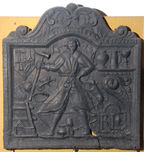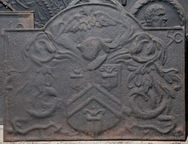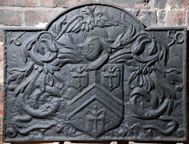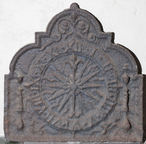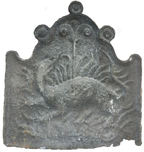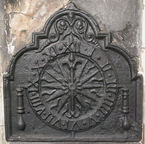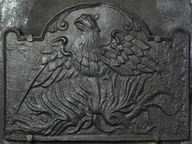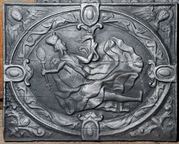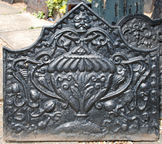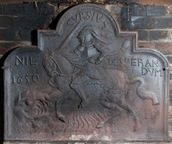-
429
Description: Arched rectangular shape with symmetrical floral scrolls on top; three horizontal plank lines; ovolo moulding all round edge of main panel; inscription along top edge of panel; central figure of a bearded man wearing knee-length coat, belted at waist, and holding a sledge hammer in his right hand, his left arm akimbo; both feet pointing to his right; various ‘tools’ of his trade arranged about him; (clockwise from top left) shield, the quarters containing a masonry hammer, a firedog, a weight, and a pair of pincers; the date split on either side of his head; a floral console supporting a shelf bearing a flagon, a tankard and a goblet; a fireback bearing the letters RL and a diamond shape; from the top of the fireback a dog leaping up at its master; between the man's legs a long-handled ladle, a weight and a cooking pot; a ringer, used to pull slag off molten iron; part of the elevation of a blast furnace, with wooden framework, casting house, and flames issuing from the top; an ore basket, wheelbarrow and a charcoal clamp
Notes: The 'Lenard' fireback; a much-copied plate. Items relating to the founder's working life are displayed to the left of the figure, those to the right reflecting his domestic life. Its individualistic design and naïve figuration are the key to identifying a distinct group of firebacks, all probably made at Brede. A pastiche of this fireback also exists (no. 668), with which it is sometimes confused. Inferior copies of this fireback were advertised in Kings Worthy Foundry's (Winchester) catalogue in the mid-20th century.
Copies of this fireback are known.
Inscription: RICHARD LENARD FOVNDER AT BRED FOVRNIS [each D is reversed] / 1636 / RL
- Decoration tags:
- rectangular with round arch (shape)
- ovolo (edging)
- whole carved pattern
- planklines
- pictorial
- historical
- text
- animals
- humans
- objects
Manufactured: in 1636 at Brede Furnace in the Weald area of England.
Current location: Anne of Cleves House, Southover High Street, Lewes, East Sussex, England.
Museum number: LH000.906 (part of the Sussex Archaeological Society museum group)
Citation: Anon., 30 Dec 1911, 'Sussex Backs and their Story', The Ironmonger.
Citation: Dawson, C., 1903, 'Sussex Iron Work and Pottery', Sussex Archaeological Collections, 46, pp. 1-54.
Citation: Gardner, J. S., 1898, 'Iron Casting in the Weald', Archaeologia, 56, 1, pp. 133-164.
- Attached to series:
- Brede group
- Personal firebacks
-
459
Description: Arched rectangular shape; fillet edging; shield, helm, crest and mantling of the Worshipful Company of Blacksmiths; date in top corners; initials at bottom, below mantling.
Notes: One of the hooked ‘1’ series; unevenly impressed, the right more deeply than the left.
Copies of this fireback are known.
Inscription: 16 50 / I M
Arms: Worshipful Company of Blacksmiths
- Decoration tags:
- rectangular with round arch (shape)
- fillet (edging)
- whole carved pattern
- armorial
- text
Manufactured: in 1650 possibly at Brede Furnace in the Weald area of England.
Current location: Anne of Cleves House, Southover High Street, Lewes, East Sussex, England.
Museum number: 1933.34.046 (part of the Sussex Archaeological Society museum group)
Citation: Dawson, C., 1903, 'Sussex Iron Work and Pottery', Sussex Archaeological Collections, 46, pp. 1-54.
Citation: Gardner, J. S., 1898, 'Iron Casting in the Weald', Archaeologia, 56, 1, pp. 133-164.
- Attached to series:
- Livery company firebacks
- Hooked '1' series
- Brede group
- IM series
-
817
Description: Arched rectangular shape; fillet edging; shield, helm, crest and mantling of the Worshipful Company of Blacksmiths (see Fig. 3); date in top corners; initials at bottom, below mantling; two planklines.
Notes: One of the hooked ‘1’ series; a copy from an evenly impressed original. Copies of this fireback were advertised in Kings Worthy Foundry's (Winchester) catalogue in the mid-20th century.
Copies of this fireback are known.
Inscription: 16 50 / I M
Arms: Worshipful Company of Blacksmiths
- Decoration tags:
- rectangular with round arch (shape)
- fillet (edging)
- whole carved pattern
- planklines
- armorial
- text
Manufactured: in 1650 possibly at Brede Furnace in the Weald area of England.
Current location: in private hands, Mayfield, East Sussex, England.
- Attached to series:
- Hooked '1' series
- Livery company firebacks
- Brede group
- IM series
-
512
Description: Double arched rectangular shaped; ovolo edging; central clock dial with Roman numerals separated by stops, sunburst inside, single hand with fleur de lys pointer; teardrop weights, with finials above, suspended from each side; symmetrical tendrils above; date split below dial.
Notes: One of the ‘hooked 1’ series of firebacks; two versions exist of this fireback, the other without finials above the suspended weights. Copies were advertised in Longden & Co.'s (Sheffield) catalogue c.1911, and the Carron Company's catalogue.
Copies of this fireback are known.
Inscription: I · II · III · IIII · V · VI · VII · VIII · IX · X · XI · XII / 16 5 [2]
- Decoration tags:
- rectangular with round arch (shape)
- ovolo (edging)
- whole carved pattern
- pictorial
- text
- objects
Manufactured: in 1652 possibly at Brede Furnace in the Weald area of England.
Current location: Penshurst Place, Penshurst, Kent, England.
Citation: Gardner, J. S., 1898, 'Iron Casting in the Weald', Archaeologia, 56, 1, pp. 133-164.
- Attached to series:
- Hooked '1' series
- Brede group
-
891
Description: Quasi-arched rectangular shaped; unique, cavetto-moulded edging, which loops upon itself three times. A mythical salamander shown in the flames which legend states it is able to resist; behind is what appears to be a palm tree.
Notes: Other known variants are dated; this variant confirms that the dates were added to subsequent castings. Corrosion to the bottom right corner may have obliterated a letter 'M' seen on another casting; presumably part of 'IM'.
- Decoration tags:
- rectangular with ornate arch (shape)
- cavetto (edging)
- whole carved pattern
- pictorial
- mythological
- animals
Manufactured: in the mid-17th century possibly at Brede Furnace in the Weald area of England.
Current location: not known.
Citation: Schubert, H. R., 1957, 'A Forgery in Iron', Journal of the Iron & Steel Institute, 165, p. 125.
- Attached to series:
- Hooked '1' series
- Loop edged firebacks
- Brede group
-
589
Description: Double arched rectangular shaped; ovolo edging; central clock dial with Roman numerals separated by stops, sunburst inside, single hand with fleur de lys pointer; teardrop weights suspended from each side; symmetrical tendrils above.
Notes: One of the ‘hooked 1’ series of firebacks - the number ‘1’ is just discernable bottom left; two versions exist of this fireback, the other having finials above the suspended weights.
Copies of this fireback are known.
Inscription: I · II · III · IIII · V · VI · VII · VIII · IX · X · XI · XII / 16...
- Decoration tags:
- rectangular with round arch (shape)
- ovolo (edging)
- whole carved pattern
- text
- objects
Manufactured: in the mid-17th century possibly at Brede Furnace in the Weald area of England.
Current location: Ham House, Richmond, Surrey, England.
Museum number: 1139737 (part of the National Trust museum group)
- Attached to series:
- Hooked '1' series
- Brede group
-
590
Description: Quasi-arched rectangular shape, semi-circular protrusions on top corners; cavetto-moulded edging; two mirrored scrolls inside arch; a phoenix in flames, its wings displayed and inverted.
Notes: A defaced variant of no. 895, which bears the date, 1650, and the initials, IM; a loop normally at the top is absent, and careless pouring of the iron has obliterated some of the detail down the right side of the casting.
Copies of this fireback are known.
- Decoration tags:
- rectangular with round arch (shape)
- cavetto (edging)
- whole carved pattern
- planklines
- pictorial
- mythological
- animals
Manufactured: in the mid-17th century possibly at Brede Furnace in the Weald area of England.
Current location: Ham House, Richmond, Surrey, England.
Museum number: 1139821 (part of the National Trust museum group)
- Attached to series:
- IM series
- Hooked '1' series
- Brede group
- Phoenix firebacks
-
598
Description: Rectangular with fillet edging; central, oval panel with fillet edging containing the semi-reclining, begowned figure of Cleopatra, a mirror/sceptre in her right hand and an asp in her left hand; oval border with astragal and fillet edging and undulating foliage; in each of the top spandrels, a face of a putto; in the bottom spandrels, a triangular design of swirled foliage; at the centre of each side, overlapping the central oval border, an oval cartouche with scrolls in the inward facing side; four horizontal plank lines regularly spaced.
Notes: The naivety of the figuration and the similarity of the scrolled designs suggest that this may be the work of the same pattern-maker as the Lenard fireback. Three tapestries of the death of Cleopatra, one of them made for the Swedish royal court, were inspired by artwork by Karel van Mander II (1579-1623), which is likely to have been the inspiration for this fireback as well.
- Decoration tags:
- rectangular (shape)
- fillet (edging)
- whole carved pattern
- planklines
- pictorial
- historical
- humans
Manufactured: in the mid-17th century in the Weald area of England.
Current location: Mark Ripley Forge & Fireplaces, Northbridge Street, Robertsbridge, East Sussex, England.
- Attached to series:
- Brede group
-
638
Description: Rectangular with cavetto curves rising to corners and a ‘pediment’ top; fillet edging with low-relief, alternate regularly-spaced semi-circles and triangles inside; two-handled flower vase with gadrooned upper surface and symmetrical flower design in relief below; trailing vines and flowers issuing from top and descending through handles to base; human face at top; second half of date to right of vase base.
Notes: Another version, probably by a different pattern-maker, is dated 1662; a recasting; an earlier casting measures 665mm x 610mm
Copies of this fireback are known.
Inscription: [...] 52
- Decoration tags:
- rectangular with canted top corners and triangular arch (shape)
- scalloped fillet (edging)
- whole carved pattern
- pictorial
- text
- plants
- objects
Manufactured: in 1652 possibly at Brede Furnace in the Weald area of England.
Current location: Mark Ripley Forge & Fireplaces, Northbridge Street, Robertsbridge, East Sussex, England.
- Attached to series:
- Gadrooned vase firebacks
- Hooked '1' series
- Brede group
-
657
Description: Rectangular with curved top corners; Arched rectangular extension on top; ovolo edging; mounted figure in 17th cent. armour riding down a dragon to the left and below, sword in hand; inscription across top and either side of horseman; date below left; initials below right.
Notes: Probably a representation of St George and the Dragon, with political undertones, given the date. Cursius may be a mis-spelling of Marcus Curtius, who sacrificed himself for the good of Rome. Nil Desperandum - Despair not. Other firebacks also bear the initials, IM, which probably relate to the pattern maker, some with a similar style of lettering.
Copies of this fireback are known.
Inscription: CVRSIVS / NIL DESPERANDVM / 1650 / IM
- Decoration tags:
- rectangular with round arch (shape)
- ovolo (edging)
- whole carved pattern
- pictorial
- allegorical
- text
- animals
- humans
Manufactured: in 1650 possibly at Brede Furnace in the Weald area of England.
Current location: in private hands, Rolvenden, Kent, England.
- Attached to series:
- IM series
- Hooked '1' series
- Brede group
